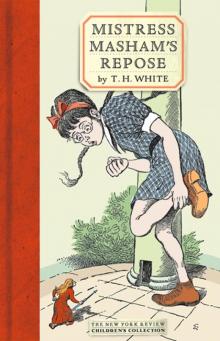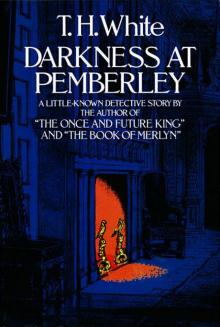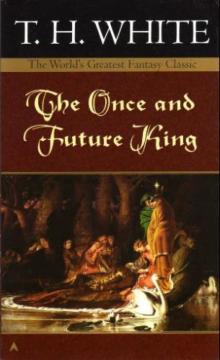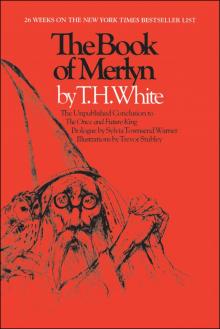- Home
- T. H. White
Mistress Masham's Repose
Mistress Masham's Repose Read online
THE NEW YORK REVIEW CHILDREN’S COLLECTION
New York
Contents
Title Page
Dedication
Epigraph
MISTRESS MASHAM’S REPOSE
Chapter I
Chapter II
Chapter III
Chapter IV
Chapter V
Chapter VI
Chapter VII
Chapter VIII
Chapter IX
Chapter X
Chapter XI
Chapter XII
Chapter XIII
Chapter XIV
Chapter XV
Chapter XVI
Chapter XVII
Chapter XVIII
Chapter XIX
Chapter XX
Chapter XXI
Chapter XXII
Chapter XXIII
Chapter XXIV
Chapter XXV
Chapter XXVI
Chapter XXVII
Chapter XXVIII
Chapter XXIX
Chapter XXX
Map of the Palace of Malplaquet
Biographical Notes
Copyright and More Information
FOR AMARYLLIS VIRGINIA GARNETT
“I took with me six Cows and two Bulls alive, with as many Yews and Rams, intending to carry them into my own Country and propagate the Breed.... I would gladly have taken a Dozen of the Natives ...”
—Gulliver’s Travels
MISTRESS MASHAM’S REPOSE
CHAPTER I
MARIA was ten years old. She had dark hair in two pigtails, and brown eyes the color of marmite, but more shiny. She wore spectacles for the time being, though she would not have to wear them always, and her nature was a loving one. She was one of those tough and friendly people who do things first and think about them afterward. When she met cows, however, she did not like to be alone with them, and there were other dangers, such as her governess, from which she would have liked to have had a protector. Her main accomplishment was that she enjoyed music, and played the piano well. Perhaps it was because her ear was good that she detested loud noises, and dreaded the fifth of November. This, however, with the cows, was her only weakness, and she was said to be good at games.
Unfortunately she was an orphan, which made her difficulties more complicated than they were with other people. She lived in an enormous house in the wilds of Northamptonshire, which was about four times longer than Buckingham Palace, but was falling down. It had been built by one of her ducal ancestors who had been a friend of the poet Pope’s, and it was surrounded by Vistas, Obelisks, Pyramids, Columns, Temples, Rotundas, and Palladian Bridges, which had been built in honor of General Wolfe, Admiral Byng, the Princess Amelia, and others of the same kidney. Maria’s parents had made a desperate attempt to keep the grounds in order. They had been killed in an accident, however, and after that there had been no money left, not even enough to live on respectably in a boarding-house, somewhere else. The Rates and so on had used up all the available income, and nobody could be persuaded to buy the place for a school nor for a hospital. Consequently she and her governess had to sleep in two bedrooms which still had a bit of roof over them, the governess using one of the smaller drawing rooms to live in, and they had a cook to look after them, who dwelt in the kitchen. It is literally true that this cook had a bicycle in the basement corridor, which she used to ride along the corridor, when she had to answer the bell.
The house had 365 windows, all broken but six, 52 state bedrooms, and 12 company rooms. It was called Malplaquet.
Maria’s governess was a Miss Brown. She had been appointed by the local vicar, who was Maria’s guardian. Both the Vicar and the governess were so repulsive that it is difficult to write about them fairly.
The Vicar was 5 ft. 7 ins. in height, and looked as if he were fifty years old. His face was red, with hundreds of little veins of a purple color, because he suffered either from blood pressure or from a weak heart or from both. It was difficult to see his eyes, partly because they were of the same general color as the rest of his face, and partly because he wore thick spectacles, behind which they lurked like oysters. His hair was parted in the middle and brushed flat. He had rather pouting bluish lips, and he walked upright and slow, giving a faint humming noise from the back of his nose, like a bee. He had been a housemaster in a public school before he got the job as Maria’s guardian, and his only pleasure then had been in caning the boys—but he had not been able to do so much of this as he would have liked to do, owing to his heart. His name was Mr. Hater. He was a bachelor. It was suspicious that he had a Rolls-Royce, and spent much of his time in London, while Maria had to live in the ruined house on sago and other horrors.
Miss Brown had been Mr. Hater’s matron at the public school. She must have had some mysterious hold over him, for it seems impossible that he could have chosen her freely, considering what she was. Her nose was sharp and pinched, with a high bridge, but the rest of her was podgy. When she sat down, she spread, as a toad does on one’s hand. Her eyes were pebble-colored and her hair was yellow. It was drawn in a tight bun. She wore rimless pincenez. She was about the same age as the Vicar, but a good deal shorter. She was cruel in a complicated way. For instance, when Maria’s last uncle had been alive, he had sometimes remembered to send the child a box of chocolates for Christmas. Miss Brown’s arrangements for any such parcel had usually been fixed in stages. First, Maria had not been allowed to open it when it came, “in case it had germs.” It had been sent down to the kitchen to be baked. Then Maria had been sent for, to the Northwest Drawing Room, in which Miss Brown resided, and the ruined parcel had been placed before her to be undone. The next step had been to claim that Maria had dirty hands, untruly, and to send her back to the kitchen, a ten minutes’ walk, to wash them. When she had got back at last, agog with expectation, and the poor melted chocolates had been unstuck from the brown paper, Miss Brown used to condemn them as improperly packed and throw them into the nearest lake with her own fair fingers “for fear they would make the child ill.”
It is difficult but important to believe that this precious pair may have been trying to do the best they could, considering the kind of people they were.
Maria had two real friends, the cook and an old professor who lived in a distant part of the grounds. She was sometimes very unhappy and sometimes very happy, because people fly between wider extremes when they are young. Her happiest times were when the Vicar was in London and Miss Brown was in bed with a headache. Then she would be mad with pleasure, a sort of wild but earnest puppy rushing about with the slipper of her imagination, tearing the heart out of it.
It was on a summer day such as this, with her tormentors well out of the way, that she decided to visit the Quincunx, to try some piracy at sea.
The Quincunx was one of the lakes at the foot of the lawn on the South Front. It was overgrown with trees, huge alders and beeches and wild cherries and sequoias and cedars, all planted by the numerous acquaintances of the poet Pope, and its surface was matted with water lilies, and there was a decayed wooden boathouse with a punt in it, which leaked. In the middle of the lake there was a small island choked with brambles, and, on the island, there was a plastered temple in the shape of a cupola, or rather, to give it its proper name, of a monopteron. It was a dome like the top of an eggshell, raised on five slender columns, and it was called Mistress Masham’s Repose.
But nobody had ever reposed there since the death of Queen Anne. Nobody had cleared the nettles from the little island, nor swept the deep leaf mold from the marble steps, nor cut back the laurels and rhododendrons and blackberries which crowded round the forgotten temple, even seeming to climb the pillars. All the dainty elegance which had once be
en made so carefully, by hands which had intended it to stay elegant, had been abandoned in the March of Mind. The lake itself was silted with weeds, because there was no money left to cut them, and the island had become a sort of Atlantis, lost in the seas. Maria was the only person who knew the weed lanes by which it could be reached. She had never landed there, however, because of the tangles.
It was a glorious day in June—for that matter, it was the Glorious First of June—and the sun was resounding on the great, green sweep of the lawn. The farmer who rented the land was chasing his sheep about, with a hot-buttered face, waving a bottle of lotion for maggots; the gray squirrels were chattering and cursing in the Chestnut Avenue; the bullocks in the Jubilee Field, safe on the other side of the Quincunx, were flicking their tails and occasionally thundering off elsewhere, because the clegs bit them; cuckoos were changing their tunes; the insect world was humming in the wilderness of shining evergreens; there were rabbits, and long grass, and small birds, and Maria was as brown as a berry.
She lay face downward in the punt, looking over the stern into the deep water. Her knees, and most of the front of her, were green with slime; the water from the bailing scoop had run up her sleeve. She was happy. When the boat dawdled to a stop, she gave it a stroke to keep it going. Under her nose, she watched the mare’s-tail and other flora of the ocean floor, as the prow edged its way between the water lilies. Dragonflies, like blue needles, and damsel flies like ruby ones—the husband keeping his wife in order by gripping her tightly round the neck with a special pair of pincers on the end of his tail—hovered over the surface. By going gently, she could sometimes pass above a flight of perch without disturbing them. Or rather, they would raise their spiky fins, blush out the dark anger of their bars, and make mouths at her. Once or twice, she passed a pike, only six inches long, basking under the flat green leaves, and once she came close to the meeting place of the tench—who made themselves scarce with a loud plop. They had been lazily scratching their backs on the lilies, like a school of elephants.
The lakes of Malplaquet were, in fact, a wonderful place for coarse fishing. In the old days, before they were weeded up, the Northampton Anglers used to go there twice a year for competitions. The tench ran big, up to five pounds or more, which was practically the record weight, and there was sometimes taken a pike of twenty pounds. The perch were fair, but not impressive. There were also some small roach.
When she had come abreast of the little island of Mistress Masham’s Repose, she began to feel piratical. Swouns and Slids, she said to herself, but you could stap her vitals if she did not careen there, and perhaps dig up some buried treasure while about it. She felt that she could do with a couple of skellingtons, or with a cross marked in dry blood on the wrinkled parchment of a map.
The island had lilies all round, mixed with frogbit and water crowfoot, so dense that it was difficult to push against them.
She paddled round, looking for a place where she could shove through. She laid her matchlocks handy on the thwart, first blowing on the priming so that the rum in her breath nearly caught fire. She loosened her hanger in the scabbard, and paced the poop.
The only place for landing was a fallen larch—which had dropped there as a cone since Lady Masham had died ennobled, had grown to its full stature, rotted, and blown down. It lay outward from the isle, bridging the worst part of the lilies. Some of its branches still tried to dress themselves in green.
Maria laid her bark alongside the end of the larch, and tied it up so that it could not drift away—an Inconvenience, as Gulliver tells us, which all prudent Mariners take special Care to provide against. Then she took off her shoes and stockings, thinking that she would climb more easily in bare feet. She boarded the tree bole, brandishing her cutlass, and swarmed ashore with the battle cry of a Maria, her spectacles twinkling fiercely in the sun.
CHAPTER II
The island on which she found herself was about the size of a tennis court. It had been carried there on boats, when the first duke had been beautifying his park, and it had risen from the water two hundred years before, an artificial emerald of green grass, crowned by the white dome of its cupola. There, perhaps, the Mistress Hill who was to become Mistress Masham—or even Mistress Morley herself, had sat in silks and laces, in the summer weather, drinking tay. If Mistress Morley had been there, she probably enjoyed a dash of brandy in the smoaking Tyde.
But now the island was tangled with every kind of briar. It had a boma round it, an outer ring of blackberries and nettles, choking the jungle of the shrubbery which faced the visitor. There seemed to be no way of reaching the little temple without pain, for the nettles were ready to sting and the briars were ready to prick, and what she really needed was a machete—or any similar instrument used by Indians, in cutting their trackways through the Bush.
If she had been a gamekeeper with thick clothes and leather leggings, she might have been able to push her way through; if she had been a farm laborer, she could have cleared a path with her brish-hook; as she was neither of these, but a determined person all the same, except for cows, she bashed her way with the punt scoop. When she had beaten down a bramble, she trod on it reluctantly; when they caught in her dress, she stopped and took them out—sometimes; when they scratched her face, she swore the appropriate oath; and so, slowly but surely, she burrowed her way into the forest belt. She tore her skirt in three places, and scratched the brown legs horribly, until she had to go back for the shoes.
The tanglewood stopped suddenly, several yards from the steps of the temple, and the intruder came to a halt with a blackberry branch in her hair.
Where the brambles ended, the grass began: the same neat, artificial grass which Lady Masham must have known. It was still kept as short, or even shorter. It was as smooth as a bowling green.
Indeed, the place was like a bowling green. It was hedged with the thicket, as such greens often are with yew. In the middle, there was the beautiful, sun-drenched temple, rising airily on its pillars.
But what was strange—and here Maria’s heart went Pat, she knew not why—the strange thing was that everything was neat.
She looked everywhere, but not a soul was to be seen. Not a leaf stirred in the little amphitheater, nor was there any trace of a hut to live in. There was no shed to hold a lawn mower, nor any mower standing on the lawn.
Yet somebody had mowed the grass.
Maria took the bramble out of her hair, disentangled herself from the last branches, and went forward to her doom.
The plaster inside the dome had fallen in some places; but the wooden slats, which were visible in most of the ruined ceilings of her home, were not exposed in this one. It looked as if the roof had been repaired from inside, with clay or paper, as if it had been done by wasps. Also, and this was strange again, there was no plaster on the floor. It had been cleared away.
Everything was so clean, so different from the wasteland which she had come through—so square and round and geometrical, just as it had been when first erected—that her eye was drawn to details.
She saw: first, a square opening, about eight inches wide, in the lowest step, which she took to be the ventilator of a damp course—but there was a path leading to it, trodden in the fine grass, a path for mice; next, she saw a seven-inch door in the base of each pillar, possibly also connected with the damp course—but, and this she did not notice because they were nearly as small as match heads, these doors had handles; finally, she saw that there was a walnut shell, or half one, outside the nearest door. Several walnuts grew in the park, though none were very close. She went to look at the shell—but looked with the greatest astonishment.
There was a baby in it.
She bent down to pick up the cradle, which she took to be some kind of toy, a toy made more beautifully than any she had ever seen. When the shadow of her hand fell across the baby, which was nearly an inch long, it wagged its head on the minute cushion of moss, put out its fists in both directions, pulled up its knees as if
it were bicycling, and gave a thin mew, which she could hear.
She did not snatch away her hand when the creature mewed. On the contrary, she grabbed the walnut. If there were one thing now in all the world which Maria was inclined to snatch, it was the baby.
She held it tenderly in the palm of her hand, not breathing for fear of spoiling it, and examined its wonderful perfection as well as she could. Its eyes, which were as small as a shrimp’s, seemed to have the proper marble-blue for babies; its skin was slightly mauve, so that it must have been a new one; it was not skinny, but beautifully plump, and she was just able to distinguish the creases round its fat wrists—creases which looked as if the thinnest hair had been tied round in a tight bracelet, or as if the hands had been fitted, on the ball-and-socket principle, by the most cunning of all the dollmakers there had ever been.
It was truly alive, and seemed to be fairly pleased at being picked up, for it held out one hand toward her nose and chuckled. At least, by listening to it like a watch, with her head on one side, she was certain that it made a noise.
While Maria was in a rapture with this windfall, she felt a sharp pain in her left ankle, as bad as if she had been stung by a bee.
Like most people whose ankles are stung, she stamped her foot and hopped about on one leg—a useless procedure, so far as bees are concerned, because it only annoys the others, and the first one cannot sting again.
She held the cradle with the greatest care while she hopped, clapped her spare hand to the hurt ankle, and confronted her assailant from a safe distance, standing on one leg.
There was a fat woman, about five inches high, standing on the marble pavement of the temple, and brandishing a sort of harpoon. She was dressed in rust-colored stuff, like the breast of a robin, and she was wild with rage or terror. Her little eyes were flashing, her hair had come down at the back, her bosom was heaving, and she was shouting in an unknown language something about Quinba Flestrina. The harpoon, which was as sharp as a needle, had a steel head half as long as the baby. Some blood was trickling between the fingers of Maria’s spare hand.

 The Once and Future King (#1-4)
The Once and Future King (#1-4) Once & Future King 05 - The Book of Merlyn
Once & Future King 05 - The Book of Merlyn Mistress Masham's Repose
Mistress Masham's Repose Darkness at Pemberley
Darkness at Pemberley The Once and Future King
The Once and Future King The Book of Merlyn
The Book of Merlyn Candle in the Wind
Candle in the Wind